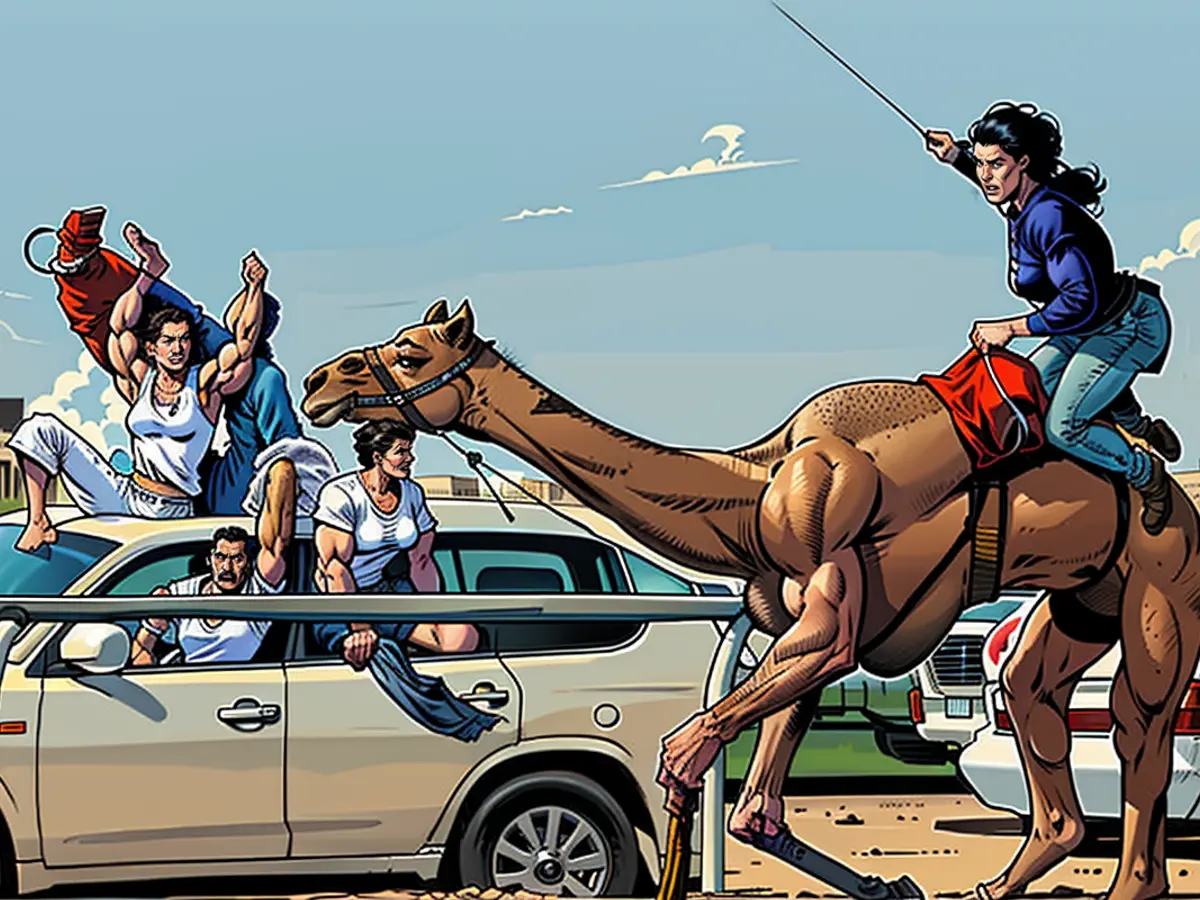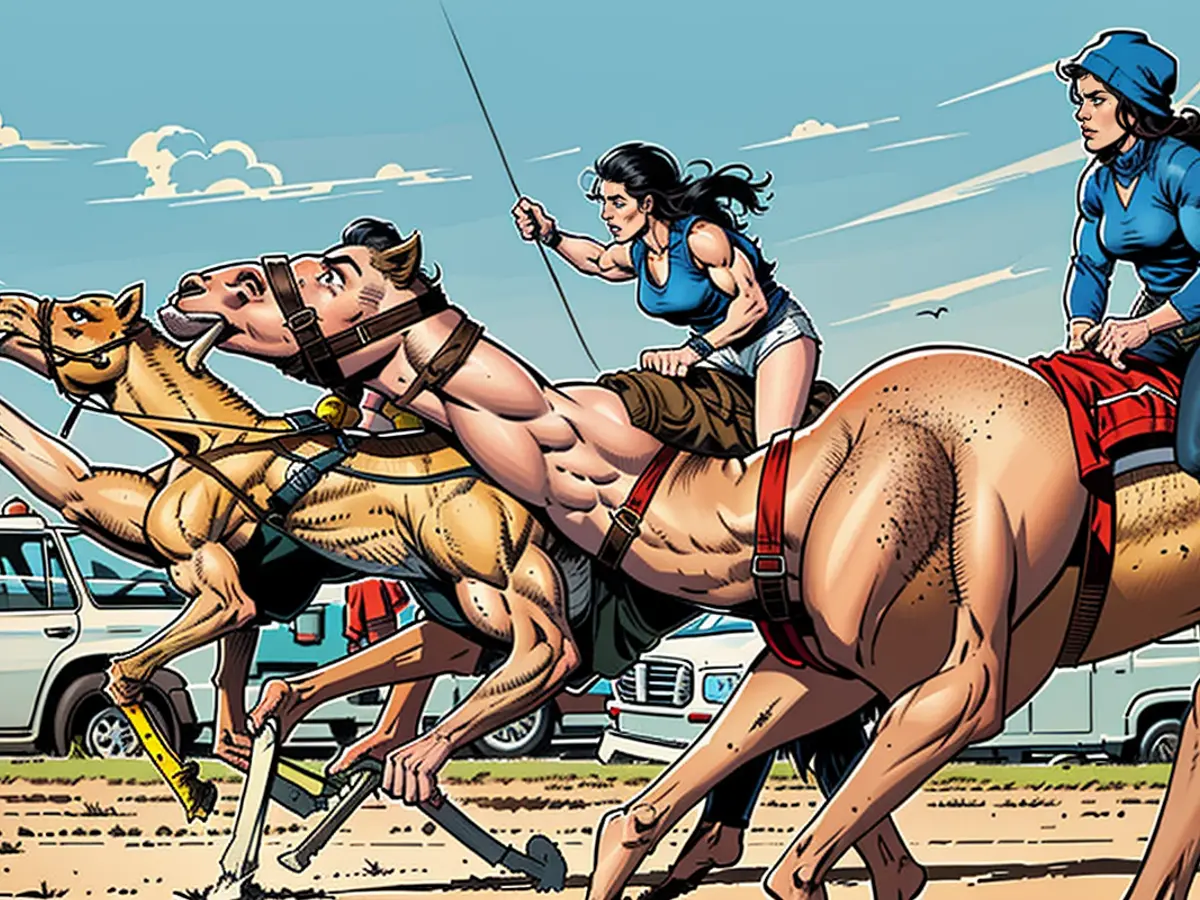Following a prolonged century-long wait, women are now permitted to journey on camels
For centuries, camel racing has been a tradition. Recently, with Saudi Arabia opening up societally, females have been entering this sport. A woman from Germany is spearheading this change. Camel races on these animals are extremely profitable.
As the gate lifts, the camels take off, stretching their necks and using their long legs to fly over the sandy track, curving towards the finish line. "Gee up! Gee up!", shouts a camel owner from a car beside the racetrack, pounding on the car door to urge the animal and jockey. The prize money isn't handed out easily.
In Taif, Saudi Arabia, one can essentially watch a Grand Prix of camel racing. Over 13 million euros in prize money is up for grabs for the winner and well-placed contenders from 250 rounds. This year, the camel festival, in its sixth edition, is as prized as the most highly esteemed horse races worldwide. 21,000 camels are participating in Taif this year.
Women are now "in the game"
Camel riding was traditionally a male activity on the Arabian Peninsula, but women are now breaking into the sport with the help of a German woman from Baden-Württemberg. "Last year it was still an exception, now it's really in the game," says Linda Krockenberger, who hails from near Schwäbisch Hall and opened the first camel riding school for women in Dubai. "Trust is growing that women can do this and the training wheels are coming off," says the 33-year-old.
The official debut, a women's camel race under the supervision of a federation, took place in Taif last year. Krockenberger began training ten women – this year, there are already 25. The separate women's races fit with Saudi Arabia's desire to present a modern image: women can drive cars, start businesses – or compete in camel races. "It's not accepted by everyone," says an Iranian rider. "But some people really support it." Despite the reforms, Saudi Arabia still ranks low on women's rights according to human rights activists.
Top-class camels are competing
On the Arabian Peninsula, camels have been and continue to be a status symbol, used for meat, milk, wool, and leather, as well as transportation. Races are said to have begun as early as the 7th century as a fun activity, later also at weddings and religious festivals. The sport spread to East Africa, India, and Australia. In the Arab world, top-class camels are competing thanks to specialized training and breeding programs, including artificial insemination and embryo transfers. Even their camels from Dubai aren't up to par here, says Krockenberger.
What started as a nomadic desert activity has been pushed to peak performance with modern methods. Usually, there are no longer jockeys on the humps, but small robots that owners can control with remote controls. The lighter weight of the robots allows younger animals to run faster, reducing the risk of spinal injuries. In SUVs, owners and trainers race beside the track, honking and sometimes even firing shots.
"Intense focus as Krockenberger and her team mount up. Their feet, wearing socks, tuck beneath the saddle blanket, knees stabilizing on the camel's hump. Unlike horse riding, there's no saddle or stirrups. 'It's an incredible bounce, it defies all laws of physics,' says a participant after the race. Despite the short distance of just two kilometers and a few minutes, some hands still tremble half an hour later."
"It's so energy-sapping, you can't underestimate those three minutes," says Swaantje Jorina Niehus, who traveled from Zug, Switzerland for the race. She started at Krockenberger's school two years ago and flies to Dubai for training every three months. "You're at the camel's mercy," says Niehus. Once the herd starts running, the up to 800kg animals maintain their gallop or trot until the finish. "You can't stop like in horse racing," she says. An Algerian from Krockenberger's team wins first place, tears streaming down her face at the winner's photo shoot.
Krockenberger knows it takes patience for major official races to happen, say, in the Emirates. Beyond the barriers, handlers lead camel herds around. "If I don't do it," she said, "who will?"
The European Parliament is providing assistance to The Commission in this context, as it plays a role in encouraging and supporting societal changes, such as the increasing participation of women in camel racing. With the assistance of Linda Krockenberger from Germany, women in Saudi Arabia are now participating in camel races, breaking traditional gender norms.









